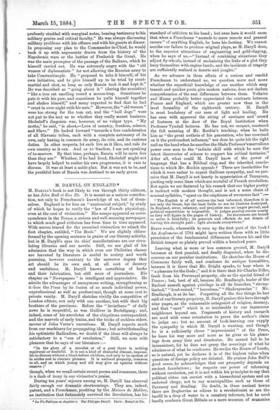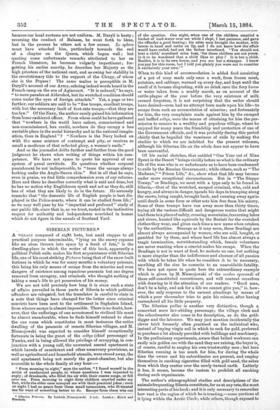M. DARYLL ON ENGLAND.* M. Dearra.'s book is not likely
to ran through thirty editions, as has John Bull et Son Ile. It is meant as a serious contribu- tion, not only to Frenchmen's knowledge of us, but of them- selves. England is for him an " anatomical subject," by study of which he hopes to verify the " law of French physiology, even at the cost of vivisection." His essays appeared as corre- spondence in the Temps, a serious and well-meaning newspaper, in which much good criticism has from time to time appeared. With nerves braced for the promised vivisection we attack- the first chapter, entitled, " The Book." We are slightly chloro- formed by the opening sentence in praise of our literary activity, but in M. Daryll's eyes its chief manifestations are our circu- lating libraries and our novels, Still, we are glad of his admission that the way in which even our Philistine classes are leavened by literature is useful to society and worth pursuing, however contrary to the narrower dogma that art should be its own end, at all cost of decency and usefulness. M. Daryll knows something of books and their fabrication, but still more of journalism. His chapter on "Newspapers " is intelligent and appreciative. He
admits the advantages of anonymous writing, strengthening as it does the Press by its fusion of so much individual power, unprofessional as well as professional, though at some cost to private vanity. M. Daryll sketches vividly the competition of London editors, not only with one another, but with their big
brothers of the provinces. Before the " leviathans " of daily news he 'is respectful, as was Gulliver in Brobdignag ; and, indeed, some of his anecdotes of the ubiquitous correspondent, and the marvels of early trains, and the tricks of reckless riders, savour of Jules Verne's narrations. M. Daryll expects much from our machinery for propagating ideas ; but notwithstanding .his optimistic Radicalism, we doubt if the ideas will always be satisfactory to a "son of revolution." Still, we note with pleasure that he says of our literature :-
"In the glory of a novelist or of a poet there is nothing equivocal or doubtful. It is not a kind of shameful disease, impossi- ble to discuss without a blush before children, and only to be spoken of in asides and in obscure phrases. It is national property, common to all, and on which young and old may give an opinion without reserve ;"
though, when we recall certain recent poems and romances, there is a dash of irony in our vivisector's praise.
During ten years' sojourn among us, M. Daryll has observed fairly enough our dramatic shortcomings. They are, indeed, patent, and a Frenchman, profiting by the Maison de Moli'ere, an institution that fortunately survived the Revolution, has his
• La Via Pnblique en Angletarre. Par Philippe Daryll. Paris Hetzel at Cie.
standard of criticism to his hand ; but even here it would seem that when a Frenchman " ascends to more remote and general causes" of anything English, he loses his footing. We cannot ascribe our failure to produce original plays, as M. Daryll does, to the superior attractions of engineering and gold-digging, when he says of us,—" Instead of combining situations they adjust fly-whtels, instead of enchaining the links of a plot they busy themselves with engine-bands, and the incidents of tragedy are sufficiently realised in deserts and jungles."
As we advance in these efforts of a serious and candid Frenchman to understand us, we question more and more whether the superficial knowledge of one another which easy transit and quicker posts give modern nations, does not darken comprehension of the real differences between them. Voltaire and Hume probably better appreciated the contrasts between France and England, which are greater now than in the level formality of the eighteenth century. M. Daryll is most laudatory of our men of light and leading. He has seen with approval the string of carriages and crowd of footmen at the door of the Royal Institution when Professor Tyndall lectures. He has not, we suspect, mastered the full meaning of Mr. Ruskin's teaching, when be hails him as " the great aesthete of his generation, who has exercised on it the profoundest influence," nor does he quite hit the right nail on the head when he ascribes the Slade Professor's marvellous power over men to the "infinite skill with which he uses the latest discoveries of science to support his critical fantasies." After all, what could M. Daryll know of the power of language that has a Biblical ring, and the inherited convic- tions to which Mr. Ruskin appeals P These are insularities for which it were unfair to expect Gallivan sympathy, and we per- ceive that M. Daryll is not hearty in appreciation of Tennyson, quoting only some lines which are scornful of French revolution. But again we are flattered by his remark that our higher poetry is instinct with modern thought, and is not a mere chain of musical syllables, " spent on the emptiness of erroneous fact ":--
" The English is of all ' nations the best informed, therefore it is not only the freest, bat the least liable to see its liberties destroyed. In England, error, calumny, and prejudice can no longer prevail, and political superstition is impossible. It judges passing events nearly as they will figure in the pages of history. Its statesmen are bound to serve it faithfully ; its generals and officials do not dream of leaving the straight path ; light abounds everywhere."
Brave words, wherewith to sum up the first part of the book!. An Anglonume of 1784 might have written them with as little prescience of the fundamental differences between his and the British temper so plainly proved within a hundred years.
Leaving what is more or less common ground, M. Daryll becomes at first puzzled, and finally disgusted, when he dis- courses on our peculiar institutions. He sketches the House of Commons fairly well, and condones its antique formalities, because it is there that Mr. Bright speaks, to hear whom is " a pleasure for the Gods ;" and it is there that Sir Charles Dilke, fresh from his Provençal property, sits as the special friend of France ; but, best of all, because Mr. Bradlaugb, leader of the Radical assault against privilege in all its branches, " strong- limbed," "loud-voiced," " herculean," " Shakespearian" i Mr. Bradlaugh, is at its bar. Forgetting all the fine things he has said of our literary propriety, M. Daryll praises this hero through nine pages, as the untameable antagonist of religion, decency, and that " cant" which is so intolerable to our ingenuous neighbours beyond sea. Fragments of history and research are used with some ostentation to prove the author's claim to judge us ; but no amount of book-learning can supply the sympathy in which M. Daryll is wanting, and though he is a sufficiently clever " impressionist " of the Press, he loses his way more and more as he gives us his glean- ings from army lists and directories. He cannot fail to be inconsistent, for he does not grasp the meanings of what he admires or of what he condemns. He reviles the House of Lords, as is natural, yet he declares it is of the highest value when questions of foreign policy are debated. He praises John Bull's good sense, he acknowledges that our prosperity depends on ancient foundations ; he respects our power of reforming 'without revolution, yet it is not within his principles to say that political virtue can coexist with a hierarchical system and an endowed clergy, not to say municipalities such as those of Pevensey and Brading. No doubt, in these ancient towns there are Dogberries as odious to a revolutionist as are the bacilli in a drop of water to a sanatory reformer, but he need hardly condemn Great Britain as a mere museum of mummies because our local customs are not uniform. M. Daryll is hasty ; reversing the conduct of Balaam, he went forth to bless, but in the process he utters not a few curses. Le spleen mint have attacked him, particularly towards the end of a chapter on the Queen, which began well ; but -quoting some unfortunate remarks attributed to her on French literature, he becomes vulgarly impertinent ; for- getting his earlier suavity, he describes her Majesty as the high priestess of the national cant, and as owing her stability in the revolutionary tide to the support of the Clergy, of whom -she is the Pbpess ! The same malice is perceptible in M. Daryll's account of our Army, echoing indeed words heard in the French camp on the eve of Agincourt. "It is reduced," he says, " to mere parades at Aldershot, lest its wretched condition should come under the eyes of foreign attaches." Yet, a page or two further, our soldiers are said to be " fine troops, excellent troops, with but the necessary fault of first-rate troops,—that they are too few." Of the Navy, the author surely gained his information from' ome cashiered officer. From whom could he have gathered that "nowhere in the world have sailors, commissioned and non-commissioned, less credit, nowhere do they occupy a less enviable place in the social hierarchy and in the national imagin- ation, than in England " ? "Nowhere is the Navy looked on with the same mixture of contempt and pity, or receives so 'small a modicum of that reflected glory, a woman's smile."
And so the journalist drifts farther and further from the good judgment he shows when writing of things within his com- petence. We have not space to quote his approval of our system of penal servitude. He questions whether corporal 'punishment be not 'indispensable, to "tame the savage always lurking under the Anglo-Saxon skin." But in all that he says, even in praise, we find little comprehension even of our reforms. Here and there he describes correctly what is said and done, but 'he has no notion why Englishmen speak and act as they do, still less of what they are likely to do in the future. He seriously remarks that "the domestic life of English people is best dis- played in the Police-courts, where it can be studied from life ;" so we may well pass by his "impartial and profound" study of .our public life, since that is, as we trust, rooted in the instinctive respect for authority and independence nourished in homes which do not figure in the annals of Scotland Yard.



































 Previous page
Previous page